VPN Statistics and Facts: User Demographics, Usage Trends & Security Insights (2025)
Updated · Sep 23, 2025
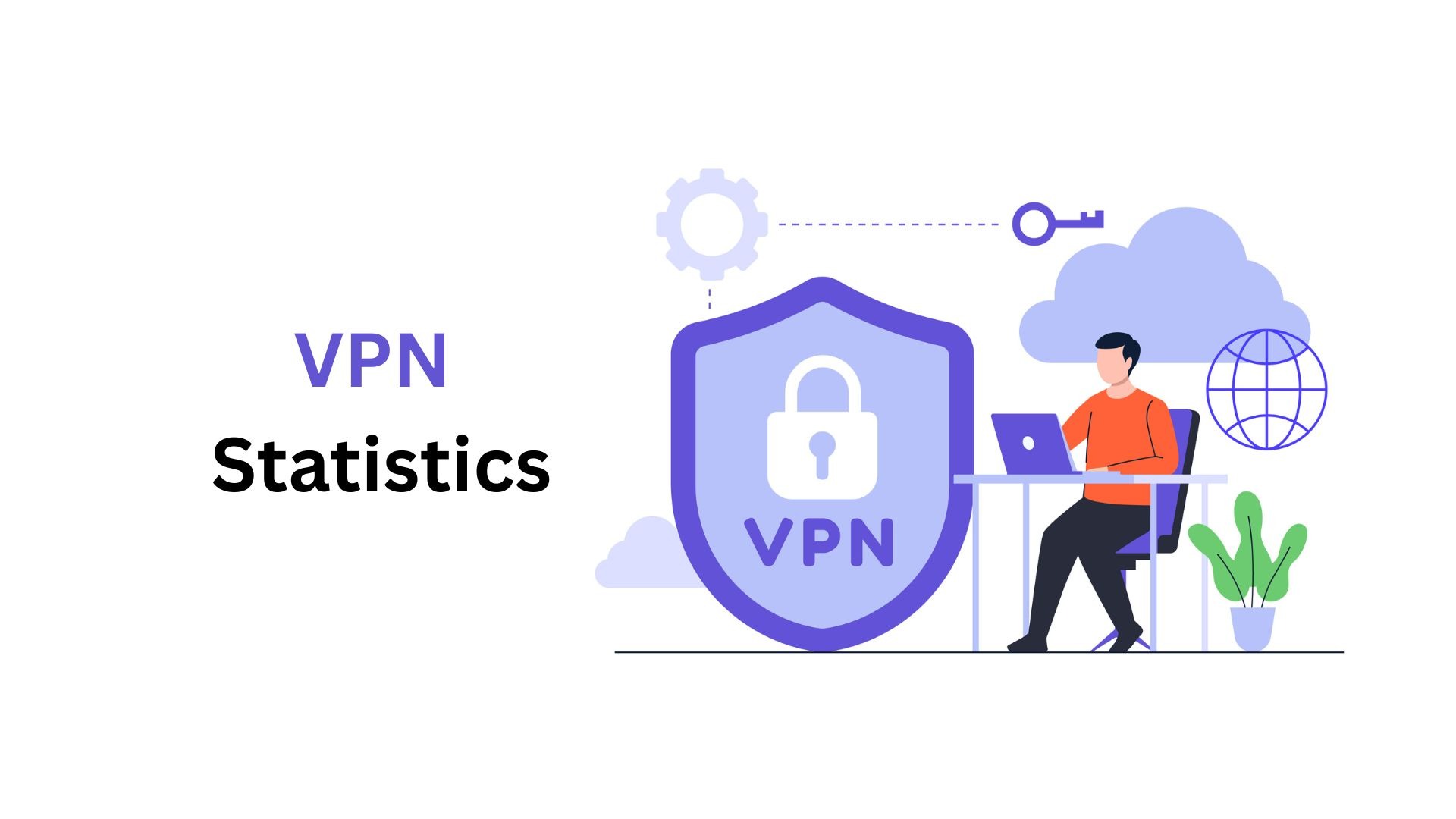
Table of Contents
- Introduction
- Editor’s Choice
- VPN Market Statistics
- VPN Search Volume Statistics
- VPN User Statistics
- By Age, Gender, and Income
- VPN Usage Statistics
- By Country
- By Use Cases (April 2024 to April 2025)
- By Frequency
- By Devices
- American VPN Usage Statistics
- VPN Market Statistics by Top Industry
- By Top Brands
- VPNs Cost Statistics
- VPN Security Statistics
- VPN Comparison Statistics by Average Upload and Download Speeds
- By Download and Upload Latency
- Top VPN Statistics by Review Scores
- Main Reasons Statistics for Using VPN
- For Buying a VPN
- Reasons for Avoiding VPN Usage
- Conclusion
Introduction
VPN Statistics: A Virtual Private Network (VPN) is a system that allows a private network to be extended over other networks, such as the Internet. It is often used when the other network is either not trusted because it is outside the user’s control or when it needs to be kept separate for security reasons. In simple terms, a VPN makes the underlying network hidden and gives users a safe way to connect.
More and more people and companies are turning to VPNs because of growing worries about hacking, online spying, and data theft. Today, VPNs are not used only for security; they also help with remote work, give access to streaming sites, and keep users safe on public Wi-Fi. Looking at VPN statistics helps us understand how these tools are being used, which countries have the most users, and what new trends are driving their growth.
Editor’s Choice
- A report published by explodingtopics.com stated that in 2024, the global VPN market will be valued at USD 44.6 billion.
- Meanwhile, there were 1.5 billion global VPN users in 2024, and it is estimated to be 1.75 billion users by 2025.
- Demand Sage’s report further claimed that in the US, 42% of people use VPNs, while in the UAE, 38% of internet users rely on them.
- About 75% of VPN users access it on desktops, and around 66% use smartphones.
- In the U.S., 44% choose free VPNs, 51% paid users, while globally, 93% of organizations use VPNs.
- Globally, VPNs are most often used for work (50.2%), followed by security (23.5%), gaming (14.7%), travel (6.7%), and privacy (4.9%).
- In contrast, the strongest interest was captured in the first half of 2025; VPN search volume was recorded at 61.
- As of 2025, currently restricted countries of VPN are Belarus, China, Egypt, India, Iran, Iraq, Myanmar, Oman, Pakistan, Russia, Tanzania, the UAE, Turkey, Turkmenistan, and Uganda.
- In the third quarter of 2024, about 42.3% of internet users in the United Arab Emirates used Virtual Private Networks (VPNs).
- In 2025, around 35% of users connect to a VPN every day, while another 42% use it almost daily.
- The insight.gwi.com report shows that the largest group of users falls between 16 and 24 years at 35%, followed closely by those aged 25 to 34 at 33%.
- About 54% of people feel secure while using a VPN, though it is not a full security solution.
- According to Statista, the fastest average download speed of VPN in 2024 was secured by NordVPN, with over 350 MB/s download.
VPN Market Statistics
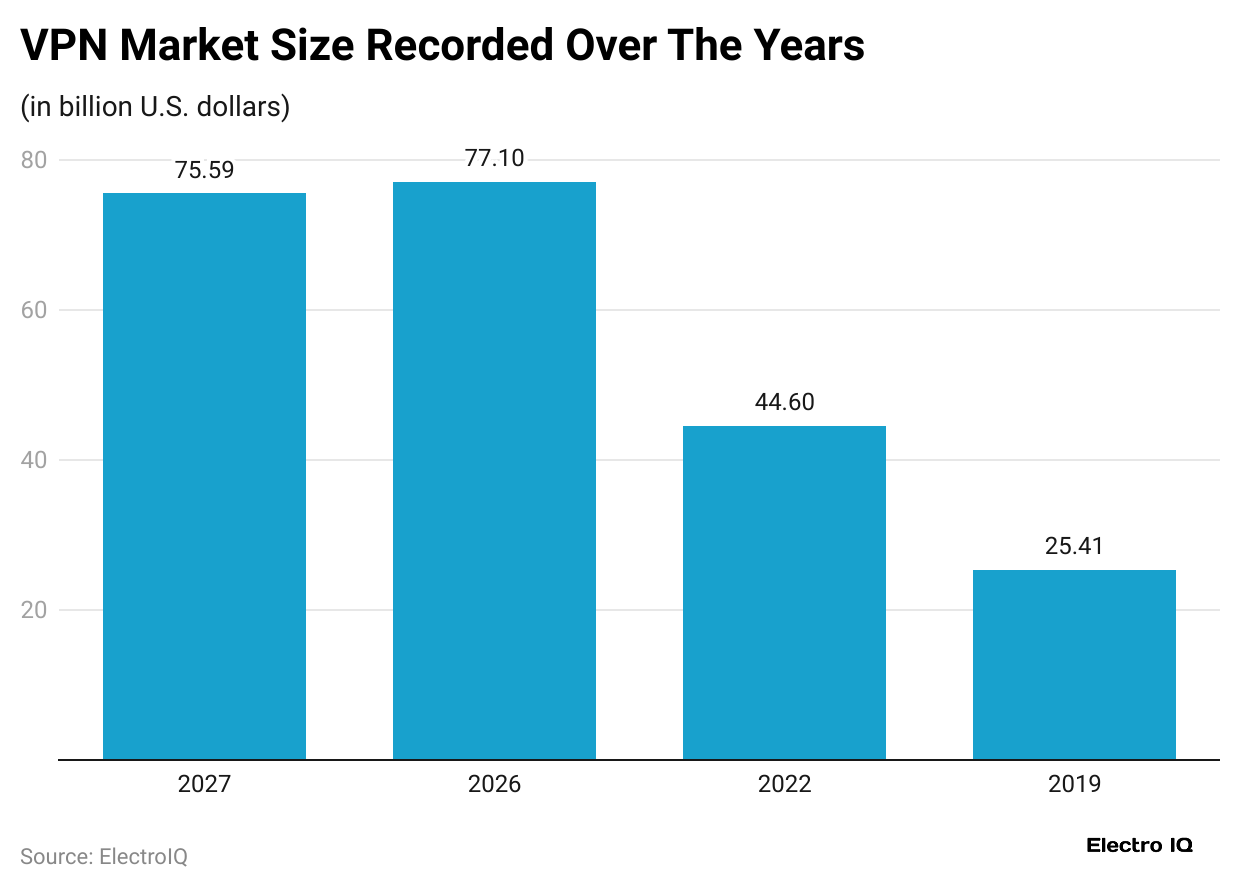
- The Virtual Private Network (VPN) market grew steadily from USD 25.41 billion in 2019 to USD 44.6 billion in 2022.
- Besides, the market is projected to reach approximately USD 77.1 billion by 2026 and USD 75.59 billion by the end of 2027.
VPN Search Volume Statistics
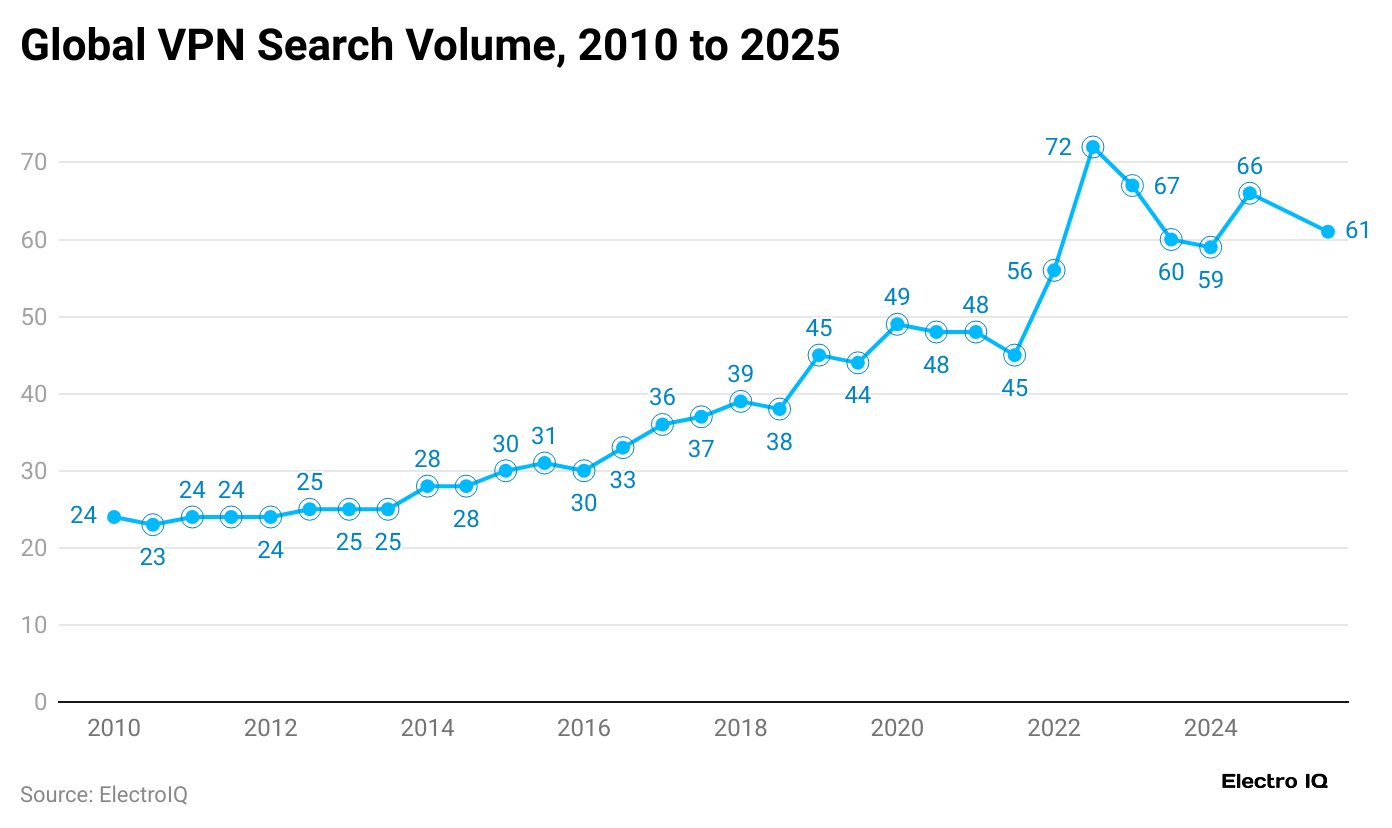
- Globally, the strongest interest was captured in the first half of 2025; VPN search volume was recorded at 61.
- In the first half of 2024, there were 59 searches made for VPNs.
- Moreover, in the second half of the year, the number of VPN searches increased to 66.
VPN User Statistics
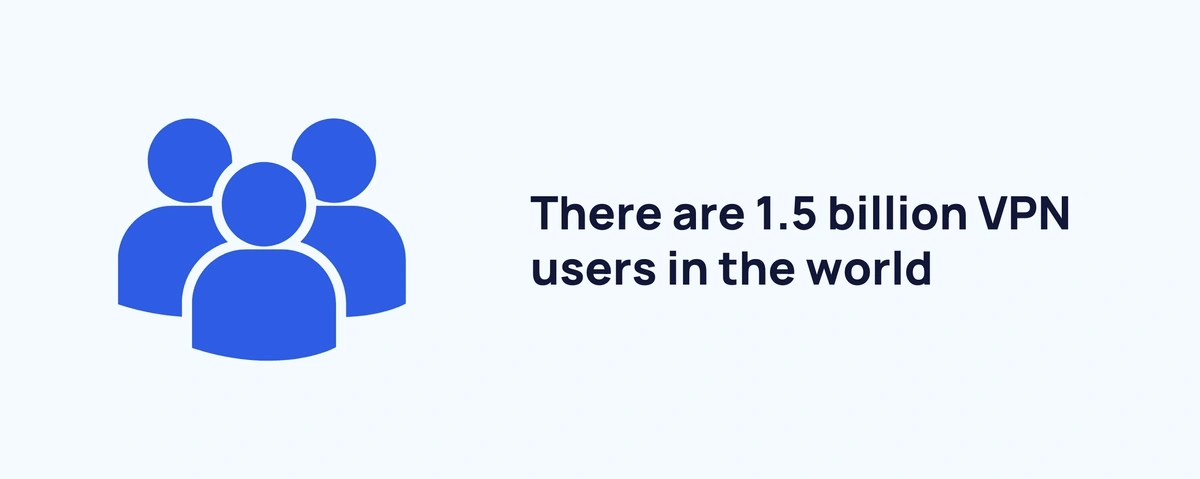
- In 2024, the number of VPN users worldwide reached about 1.5 billion.
- According to Security.org, 64% of surveyed users said they had a paid VPN subscription.
- Looking at who covers the cost, 30% use free VPNs, 26% pay for it themselves, and 13% have their organisation cover the expense.
- Additionally, 25% share the cost between themselves and their organisation.
By Age, Gender, and Income
- The insight.gwi.com report shows that the largest group of users falls between 16 and 24 years at 35%, followed closely by those aged 25 to 34 at 33%.
- Usage reduced among older groups, with 19% in the 35 to 44 range, 9% in the 45 to 54 range, and just 4% among users aged 55 to 64.
- Based on gender, males make up a majority at 62%, while females account for 38%.
- Income levels also influence VPN adoption, with 45% of users coming from the middle 50% income level, 24% from the top 25%, and 23% from the bottom 25%.
- Additionally, 8% of respondents preferred not to disclose their income.
VPN Usage Statistics
- According to security.org, VPN usage decreased from 46% in 2024 to 32% this year.
- About 54% of people don’t use VPNs, either due to a lack of awareness or need.
- Meanwhile, 28% use them only for business, and 22% rely on VPNs for both work and personal use.
- As of 2025, almost 29% of global people use VPNs only for personal needs, while 24% rely on them just for business purposes.
- Around 15% use VPNs for both personal and professional activities, and 32% reported that they do not use a VPN at all.
- In contrast, 37% use VPNs to avoid online tracking, while nearly 25% rely on them for blocked streaming access.
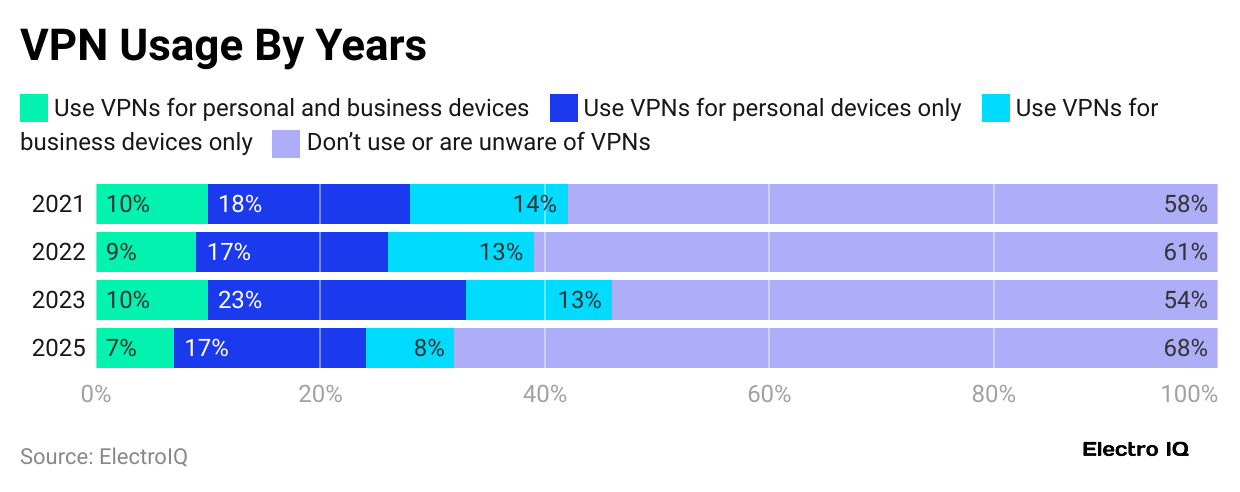
- The above graphical image shows that in 2025, only 7% of American people use VPNs for personal and business devices.
- Besides 17% of U.S. adults use VPN for personal devices only, and 8% use VPNs for business devices only.
- Lastly, 68% of them don’t use or are unaware of VPN usage.
By Country
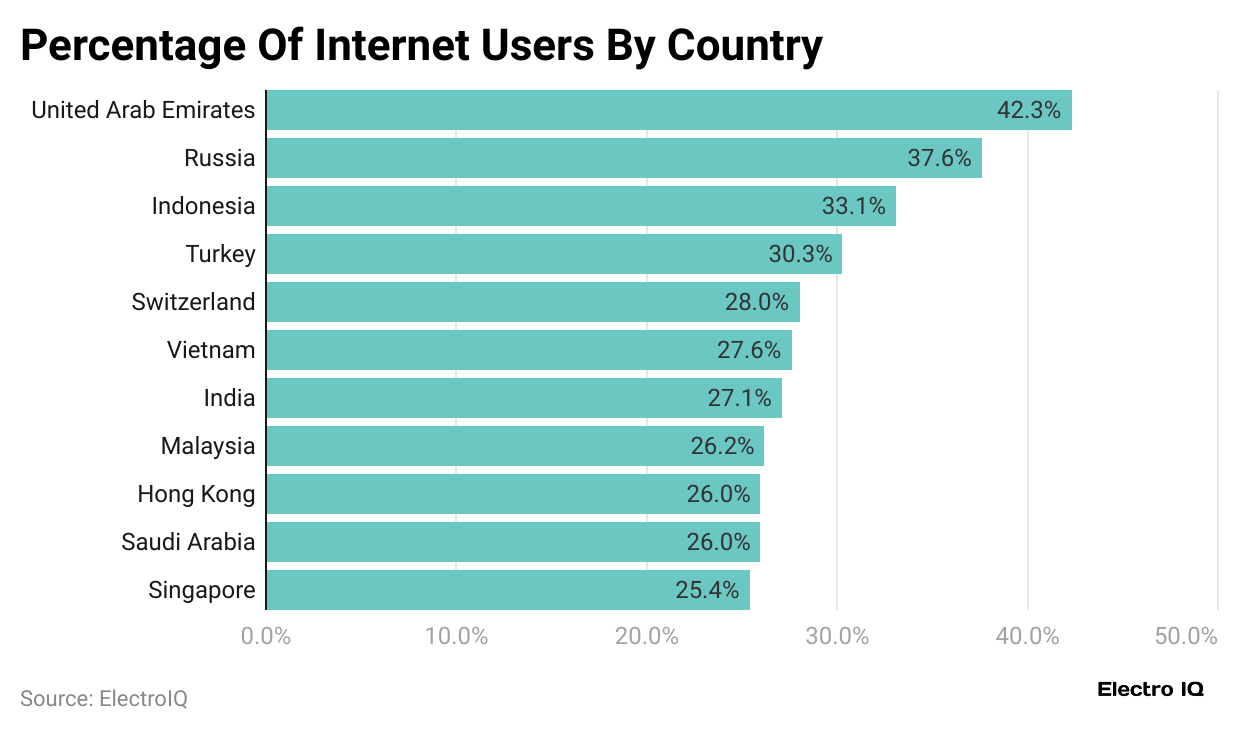
- In the third quarter of 2024, about 42.3% of internet users in the United Arab Emirates used Virtual Private Networks (VPNs) for different online activities.
- Russia came next, where nearly 37.6% of users also relied on VPNs during that time.
- Other countries with high VPN usage included Indonesia at 33.1%, Turkey at 30.3%, Switzerland at 28%, Vietnam at 27.6%, India at 27.1%, Malaysia at 26.2%, Hong Kong at 26%, Saudi Arabia at 26%, and Singapore at 25.4%.
By Use Cases (April 2024 to April 2025)
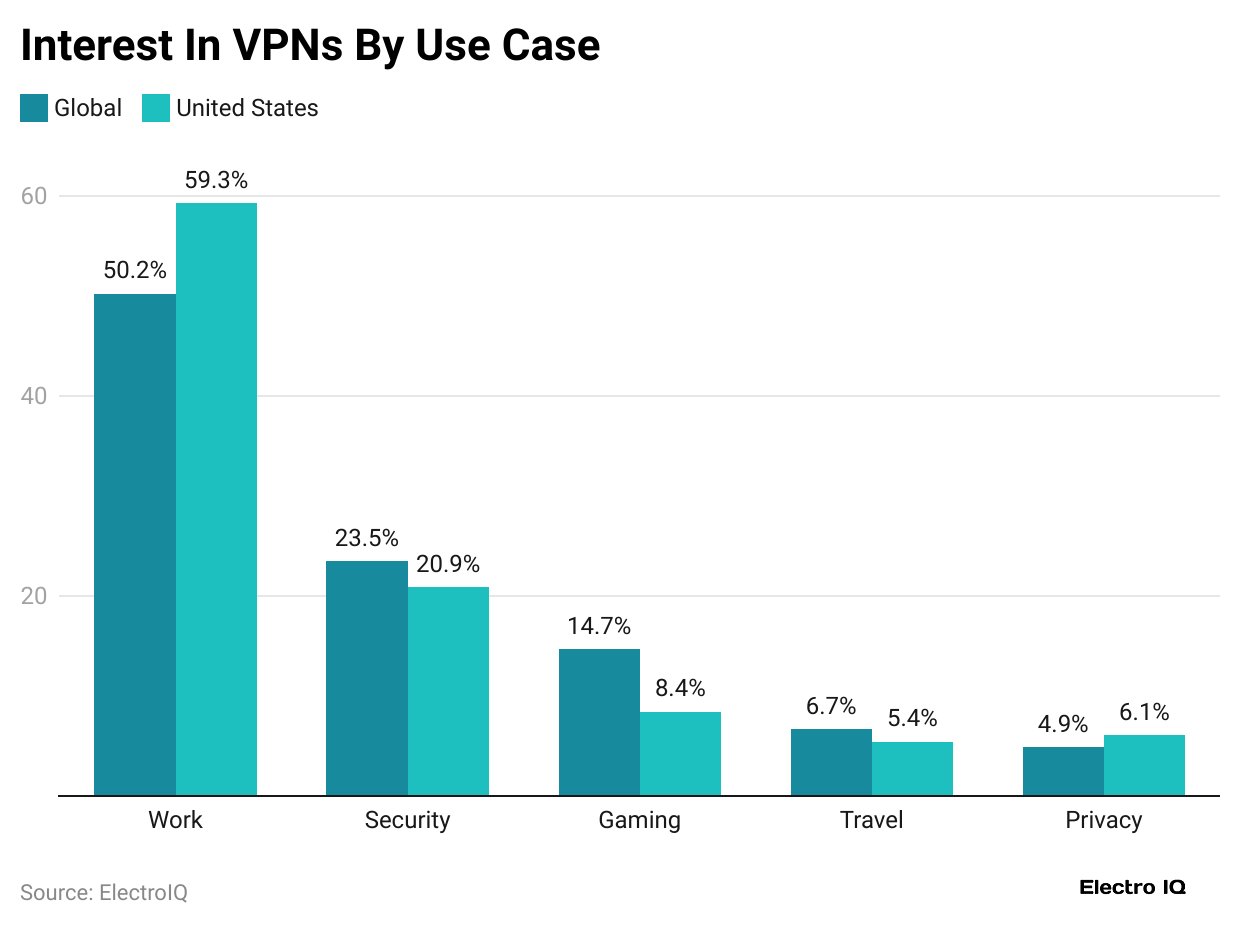
- Globally, VPNs are most often used for work (50.2%), followed by security (23.5%), gaming (14.7%), travel (6.7%), and privacy (4.9%).
- In the United States, the highest usage is also for work (59.3%), with security at 20.9%, privacy at 6.1%, gaming at 8.4%, and travel at 5.4%.
- In 2024, about 50% of people use a VPN for personal reasons, 28.3% for business, and 21.7% less than one in four use it for both personal and professional purposes.
By Frequency
- In 2025, around 35% of users connect to a VPN every day, while another 42% use it almost daily.
- Weekly usage patterns include 15% connecting four to five times, and 14% using it two to three times.
- Less frequent users make up smaller portions, with 11% using VPNs once a week, 10% connecting two to three times a month, and 9% just once a month.
- Meanwhile, 13% use VPNs less often, and 14% fall into the same “less frequent” category.
By Devices
- A survey of VPN users shows that mobile devices dominate usage, with 52% of respondents using iOS devices and 37% using Android devices.
- Desktop use is much lower, as only 6% of Windows users and 3% of Mac operating system users reported using VPNs.
American VPN Usage Statistics
- According to Demand Sage in the United States, 42% of people use VPNs, equal to about 105 million users.
- Nearly 50% of them use them for work, while the rest rely on personal devices.
- Around 10 million more adults may use it by the end of 2025.
- Usage includes 51.2% paid VPNs, 44.2% free, 27% trial, and 9.7% corporate.
VPN Market Statistics by Top Industry
- As of 2024, Cisco AnyConnect was holding the largest VPN market share at 28.6%, followed closely by Cisco VPN at 25.51%.
- Juniper VPN accounts for 10.62%, while Citrix Gateway represents 8.1% of the market.
- OpenVPN contributes 5.31%, and the remaining 21.86% is shared among other providers.
By Top Brands
- In 2025, NordVPN was the most popular choice, used by 17% of respondents.
- Proton VPN and ExpressVPN each held 9%, while Norton Secure VPN followed closely at 8%.
- Private Internet Access and Windscribe had 6% each, Google One VPN 5%, Surfshark 4%, Brave VPN 3%, Mozilla VPN, CyberGhost, Mullvad, and IPVanish 2% each, Atlas VPN none, while 11% used other brands.
VPNs Cost Statistics
- According to surfshark.com, as of May 12, 2025, the VPN product costs USD 10.88 per month without discounts, but the best discounted monthly deal is USD 3.65.
- On average, the yearly cost is USD 130.51, dropping to USD 43.86 with discounts.
| Product | Monthly price (USD) | |
| With discount | Without discounts | |
|
Surfshark |
15.45 | 2.17 |
| CyberGhost | 12.99 |
2.19 |
|
NordVPN |
12.99 | 3.74 |
| ExpressVPN | 12.95 |
4.99 |
|
Private Internet Access |
11.95 | 2.03 |
| Mozilla VPN | 9.99 |
4.99 |
|
Proton VPN |
9.99 | 4.49 |
| TunnelBear | 9.99 |
3.33 |
|
IVPN |
6 |
3.89 |
VPN Security Statistics
- About 54% of people feel secure while using a VPN, though it is not a full security solution.
- In fact, 57% reported facing cyberattacks even with VPNs.
- Serious breaches include 25 million records exposed in 2022 and 21 million in 2021.
- Free VPNs like GeckoVPN, SuperVPN, and ChatVPN were linked to dark web logins and 1.2 TB of leaked data.
VPN Comparison Statistics by Average Upload and Download Speeds
- According to Statista, the fastest average download speed of VPN in 2024 was secured by NordVPN, with over 350 MB/s download.
- For average upload speed, the leader was hide.me, at 365.5 MB/s.
By Download and Upload Latency
- Hide.me achieved the lowest download latency (approx. 5.4 ms) among VPNs in 2024.
- TunnelBear had a much higher download latency, about 67.55 ms.
- TorGuard recorded the highest upload latency of around 112.4 ms in the same Statista report analysis.
Top VPN Statistics by Review Scores
| Services | Review Score |
| NordVPN | 9.3 |
| Surfshark | 9.0 |
| Proton VPN | 8.9 |
| CyberGhost | 8.6 |
| Private Internet Access | 8.6 |
Main Reasons Statistics for Using VPN
- In 2025, people used VPNs for many reasons. About 60% wanted more privacy, while 57% focused on security.
- Around 37% used them for safer access on public Wi-Fi, and 32% to stop tracking by search engines or social media.
- For 25%, it was either a job requirement or for safer online shopping.
- Meanwhile, 23% used VPNs to watch content not available in their country, and 21% wanted to hide their browsing from internet providers.
- Torrenting was chosen by 13% of users, and 6% used VPNs for work in areas like activism, journalism, or research.
For Buying a VPN
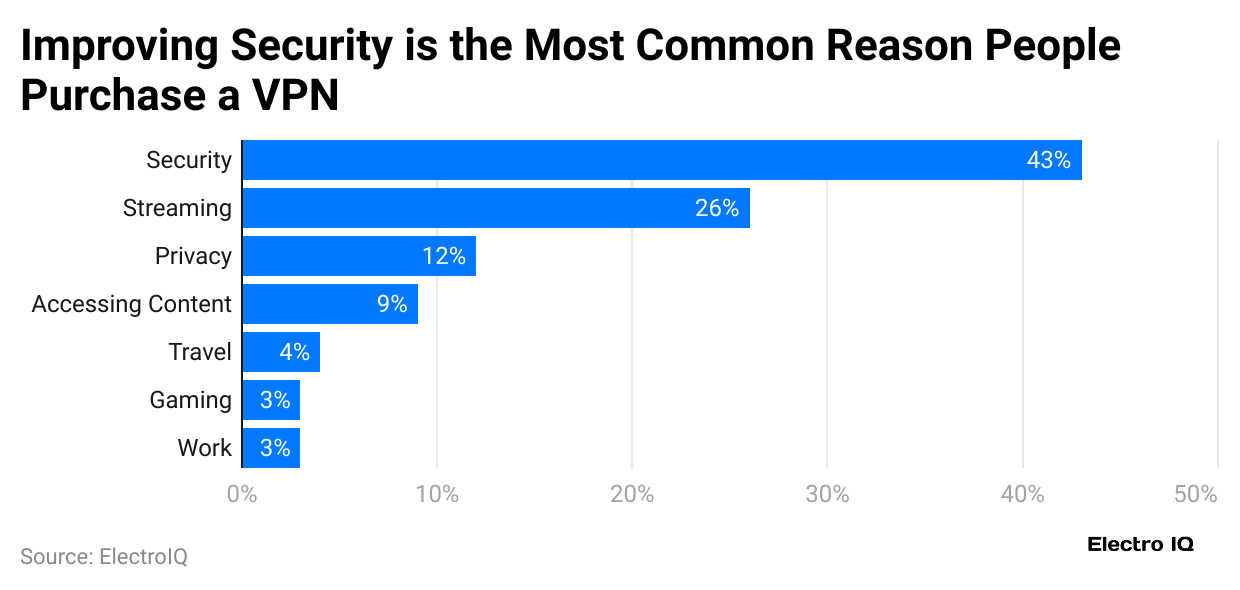
- The main reason people buy a VPN is for security (43%), followed by streaming (26%) and privacy (12%).
- Other common reasons include accessing content (9%), travel (4%), gaming (3%), and work (3%).
Reasons for Avoiding VPN Usage
- Among non-users, the most common reason for avoiding VPNs is the belief that they are not necessary, with 30% saying they don’t need one.
- Another 18% feel VPNs don’t provide enough benefit, while 15% admit they don’t know enough about them.
- Cost is also a concern, as 14% consider VPNs too expensive.
- Smaller groups mentioned other reasons, such as websites blocking VPN access (6%), difficulty in setting them up (5%), and doubts about their privacy (4%) or security (4%).
Conclusion
VPNs are no longer just special tools for online security; they are now part of daily internet use. Today, VPNs are used not just for privacy but also for safe browsing, streaming, and remote work. Since online risks are rising and digital freedom is still a challenge, more people are expected to keep using VPNs in the future.
All the above VPN statistics analyses will make a clear understanding of the market and how it plays an important role for both individuals and businesses, and their growth is set to continue in the future.
FAQ.
People use VPNs for privacy, safe browsing, streaming access, secure remote work, and avoiding restrictions.
VPN is legal in most countries, but some places restrict or ban it, like Belarus, China, Iraq, North Korea, Oman, Russia, and Turkmenistan
Yes, VPNs can slow down the internet speed because data is encrypted and routed through secure servers.
Some VPNs are free, but they often have limits on speed, data, and security.
Yes, mostly they work on all devices like phones, computers, tablets, smart TVs, and even routers, depending on the provider’s support.

Maitrayee Dey has a background in Electrical Engineering and has worked in various technical roles before transitioning to writing. Specializing in technology and Artificial Intelligence, she has served as an Academic Research Analyst and Freelance Writer, particularly focusing on education and healthcare in Australia. Maitrayee's lifelong passions for writing and painting led her to pursue a full-time writing career. She is also the creator of a cooking YouTube channel, where she shares her culinary adventures. At Smartphone Thoughts, Maitrayee brings her expertise in technology to provide in-depth smartphone reviews and app-related statistics, making complex topics easy to understand for all readers.










